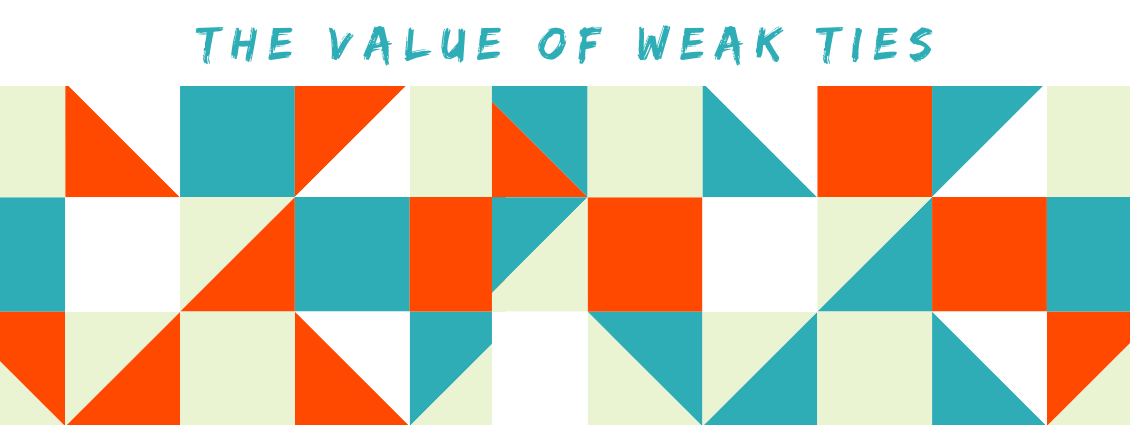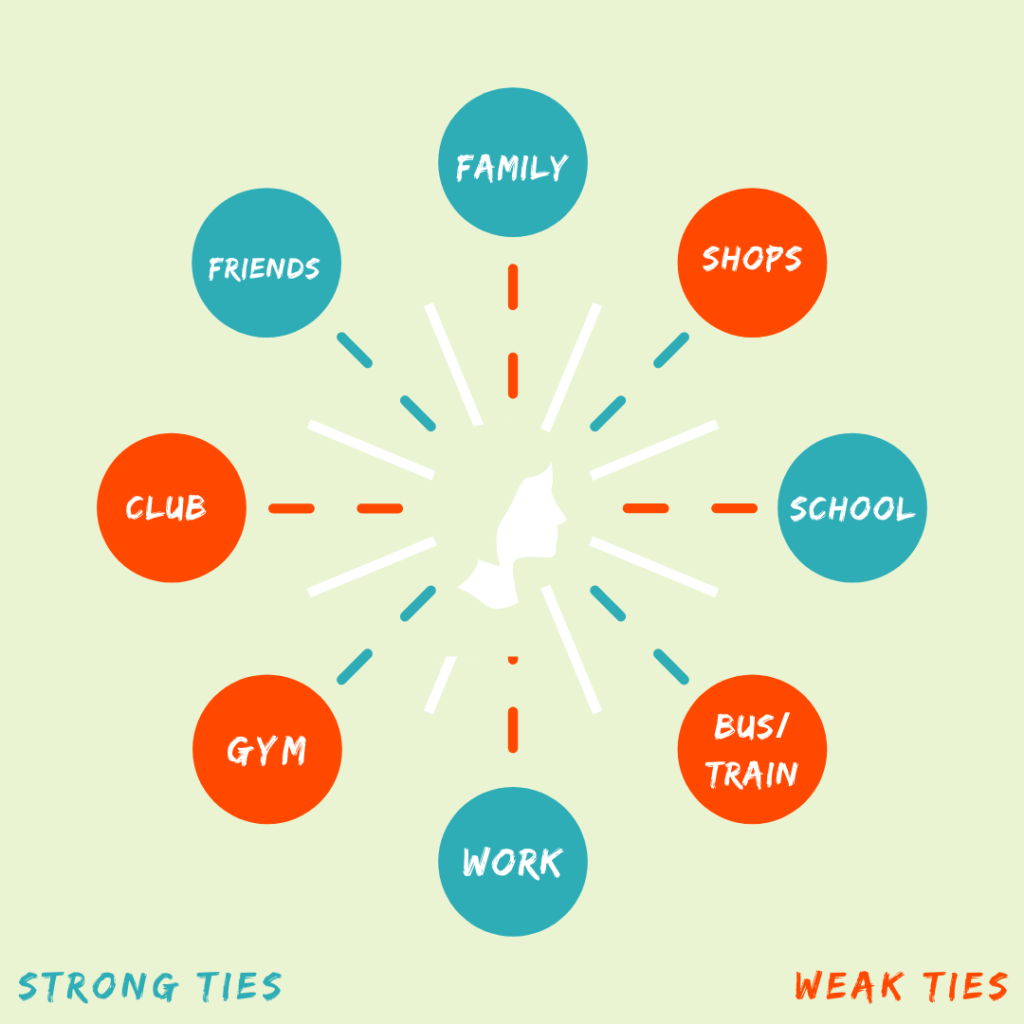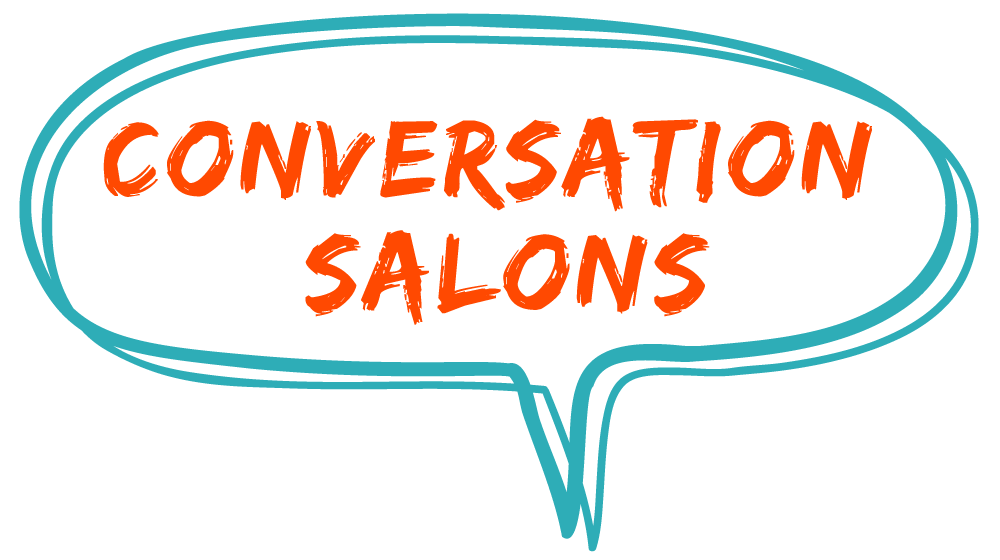
by Anavi Ruiz
Saying hello to people you don’t know or talking to the cashier when you go shopping are examples of “weak ties”. By contrast, “strong ties” are deep conversations you have with your friends, partner and family.
Psychologists believe we need both “weak and strong ties” in our lives and neither, especially the weak ones, should be underestimated. I had never thought small conversations or weak ties could be so powerful until I read Gillian Sandstrom and Elizabeth W. Dunn´s research.
Sandstrom and Dunn are senior psychology lecturers, who underline the importance of having weak ties in our lives. They conducted research called: “Social Interactions and Well-Being: The Surprising Power of Weak Ties”. The research stated: “Students experienced greater happiness and greater feelings of belonging on days when they interacted with more classmates than usual”. The conclusion reached was: “Even social interactions with the more peripheral members of our social networks contribute to our well-being”.
The information gathered by Sandstrom and Dunn´s research makes me think human beings need to live in a society. We were born to interact with others. Interaction is as important as breathing, eating and drinking water. I used to work at the airport and I really enjoyed greeting passengers. Those simple and small interactions made me feel good and cheered me up. The greeting is just an example of why weak ties are so powerful. But this is only my voice and experience. In the following paragraphs, I will give examples of weak ties enriching the lives of others.
Talking to the receptionist at work
Orlaith says: “It was so nice to talk to the receptionist at work. He called me by my name every morning and he asked me how I was. He always exclaimed ‘it’s a fabulous day’ and he infected me with his enthusiasm. Now I am working in a different place where people are busy and there is no time for socialising. We are like machines. I really miss the small chats I used to have with the receptionist because those chats made me start the day with good cheer.”
Interacting with street musicians
Anthony states: “It is absolutely a pleasure to interact with street musicians. I love to go to Grafton Street and watch the buskers there. I smile at them to say thank you for the music and they smile back to answer it’s a pleasure. I usually go and see them after work because this magical small interaction makes me forget my worries. And If I am tired, it gives me the energy to continue with my daily routine.”
Chatting with everybody in a group
Ivan underlines: “I hadn’t realised how gratifying it is to socialise with everybody in a group. Normally in a group, people pair off into smaller cohorts. The small groups are formed because they have something in common and the connection among them is special and close. But when you start to talk to other people outside your small group, you realise you can learn a lot from people who are different. It is so interesting to listen to other points of view. Or sometimes we can find out we have things in common which we didn’t expect. This makes me more curious about others and also a more understanding and empathetic person.”
Talking to tourists in the street
Anna relates: “I like to go to the streets and see what people are doing. If they seem to be lost, I offer them my help and they usually appreciate my kindness. I feel good when I can help internationals find a place. Sometimes, they teach me how to say thank you in different languages and we laugh a lot when I can’t say the word properly. Talking to tourists makes me feel more connected with other parts of the world even when I’m at home”.

All these small interactions are examples of why weak ties can be so powerful and why we need them in our lives. Whether it’s thanking musicians for sharing their passion, or moving beyond your close-knit circle to find some more surprising connections, or allowing yourself to be infected by somebody else’s good cheer, we can gain a lot from those short interactions with the people who play brief roles in our lives. It’s also wise to not underestimate the role YOU might play as a weak tie in somebody else’s life!
Take some time to reflect on those weak ties in your life, a shop worker, the bus driver, a colleague you always bump into in the kitchen, or even a busker on the street. How can you add a little value to their day?
At the Conversation Salons, we’re all about building connections beyond our usual social circle. We are creating a community in which diversity is celebrated and all voices are listened to. Join us at one of our meetups where you can build both strong and weak ties as we now know both are valuable to our well-being.
